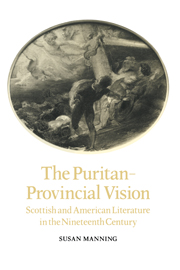Book contents
- Frontmatter
- Contents
- Preface
- Acknowledgements
- 1 Calvin's theology and the puritan mind
- 2 After Armageddon: Jonathan Edwards and David Hume
- 3 From puritanism to provincialism
- 4 The pursuit of the double
- 5 Spectators, spies and spectres: the observer's stance
- 6 ‘Is anything central?’
- Notes
- Bibliography
- Index
2 - After Armageddon: Jonathan Edwards and David Hume
Published online by Cambridge University Press: 21 January 2010
- Frontmatter
- Contents
- Preface
- Acknowledgements
- 1 Calvin's theology and the puritan mind
- 2 After Armageddon: Jonathan Edwards and David Hume
- 3 From puritanism to provincialism
- 4 The pursuit of the double
- 5 Spectators, spies and spectres: the observer's stance
- 6 ‘Is anything central?’
- Notes
- Bibliography
- Index
Summary
For if these [Calvinist] doctrines, in the whole length and breadth of them were relinquished, he did not see, where a man could set his foot down with consistency and safety, short of Deism, or even Atheism itself; or rather universal Skepticism. (Samuel Hopkins on Jonathan Edwards)
Eighteenth-century attempts to accommodate Calvin's theology to the visible achievements of reason are the strongest currents of continuity between puritanism and provincialism. No longer carried high on the triumphant confidence of the critical moment, puritans were brought to reckon with forces which indicated other ‘centres’ of experience beyond the grasp of their apocalyptic dogma; the exclusive qualities of Calvinist faith made it unable to coexist with the claim of reason to be a source of knowledge and belief, but demanded confrontation and either dominance of or submission to these claims.
Against the increasing consciousness of eccentricity which marks eighteenth-century Calvinism's struggle to find a place for itself in the ‘Age of Reason’, two voices stand out at opposite ends of the antirational spectrum. Jonathan Edwards was the strongest spokesman for orthodox Calvinism bred by New England; David Hume was a Scot who, relinquishing his Calvinist upbringing, set his foot down – with consistency if not with safety – at the other extreme of ‘universal Skepticism’. Both, through the unwavering clarity and confidence with which they perceived the contours of the puritan mind, maintained a poise of detached participation which holds their writing tautly on the near side of provincialism.
- Type
- Chapter
- Information
- The Puritan-Provincial VisionScottish and American Literature in the Nineteenth Century, pp. 26 - 46Publisher: Cambridge University PressPrint publication year: 1990



